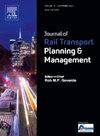解决单轨铁路走廊极短期列车重新调度问题的强化学习方法
IF 2.7
Q3 TRANSPORTATION
Journal of Rail Transport Planning & Management
Pub Date : 2024-09-25
DOI:10.1016/j.jrtpm.2024.100483
引用次数: 0
摘要
铁路运营经常会受到干扰和中断等事故的影响,这些事故会对铁路网中的列车造成临时运营限制。与实时干扰和中断相比,这些事故有时可以在很短时间内(如 24-48 小时前)被知晓,这在英国铁路运营中被称为 "短期规划"(Very-Short-Term-Planning)。本文提出了一种基于强化学习的新方法,用于在双向交通的单轨走廊中重新安排列车服务。作为机器学习的一个重要子领域,强化学习为解决 NP 难度的列车(重新)调度问题提供了另一种策略,并显示了其在平衡计算效率和解决方案质量方面的优势。我们提出了一种 Q-learning 方法,该方法采用分层奖励策略和轻量级的状态向量列车表示法,能在同质列车之间实现更高效的学习和知识共享。与现有的强化学习方法相比,我们提出的方法因其独特的状态向量表示法和新颖的分层奖励/惩罚机制,可以找到更高质量的解决方案,克服了现有方法的某些缺点。知识的可重用性是所提方法的另一个优势,因为从一个实例的训练中获得的先验知识可以显著提高同一走廊上另一个可能更具挑战性的实例的性能,同时大幅减少算法开发的计算时间和工作量。我们还讨论了强化学习算法固有的知识可重用性特点的潜在应用,相信这将有利于整个行业通过数据驱动技术解决 NP 难问题。本文章由计算机程序翻译,如有差异,请以英文原文为准。
A reinforcement learning approach to solving very-short term train rescheduling problem for a single-track rail corridor
Railway operations are regularly affected by incidents such as disturbances and disruptions, which cause temporary operational restrictions to the trains in the network. Compared to real-time disturbances and disruptions, sometimes these incidents can be known at a short notice, e.g., 24–48 h beforehand, which is known as the Very-Short-Term-Planning in British rail operations. This paper presents a novel reinforcement learning based approach for rescheduling train services for in a single-track corridor with bi-directional traffic. As an important subfield of machine learning, reinforcement learning offers an alternate strategy for tackling the NP-hard train (re)scheduling problems and shows its advantages in balancing computational efficiency and solution quality. We propose a Q-learning approach with a tiered rewarding strategy and lightweight train representation in state vectors, which enables more efficient learning and knowledge sharing among homogeneous trains. Compared with an existing reinforcement learning approach, our proposed method can find better quality solutions due to its unique representation of state vectors and a novel tiered rewarding/punishing mechanism, overcoming certain disadvantages in existing approaches. Knowledge reusability is another advantage of the proposed approach, as prior knowledge obtained from training one instance can significantly enhance the performance of another, potentially more challenging, instance on the same corridor with substantially reduced computational time and effort on algorithm development. We also discuss the potential applications of the knowledge reusability feature inherent in reinforcement learning algorithms, which we believe will benefit the entire industry in addressing NP-hard problems through data-driven technologies.
求助全文
通过发布文献求助,成功后即可免费获取论文全文。
去求助
来源期刊

Journal of Rail Transport Planning & Management
TRANSPORTATION-
CiteScore
7.10
自引率
8.10%
发文量
41
 求助内容:
求助内容: 应助结果提醒方式:
应助结果提醒方式:


